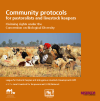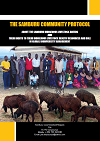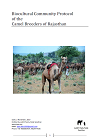Guide for livestock keepers and NGOs on how to claim rights by developing community protocols.
A community protocol is a document, produced by a local community, about the biological diversity it creates and conserves. Community protocols are an important way for local people to claim their rights under national and international law, especially through the Nagoya Protocol to the Convention on Biological Diversity.
This manual shows how pastoralists and other livestock-keeping communities can draw up a community protocol about their animal breed or production system. It describes why they should consider producing a community protocol, walks through the steps of doing so, and advices how to use the finished document. It explains in easy language the complex concepts of access and benefit sharing and how the community protocol can be used within the legal system.
This manual is aimed at community leaders and organizations, nongovernment organizations and all those concerned with managing and conserving animal breeds and production systems.
 Title: Community protocols for pastoralists and livestock keepers: Claiming rights under the Convention on Biological DiversityAuthor: LPP and LIFE Network / League for Pastoral Peoples and Endogenous Livestock Development and Local Livestock for Empowerment (LIFE) Network / 2018Description: Guide for livestock keepers and NGOs on how to claim rights by developing community protocolsFormat: ZipPages: 112Download document
Title: Community protocols for pastoralists and livestock keepers: Claiming rights under the Convention on Biological DiversityAuthor: LPP and LIFE Network / League for Pastoral Peoples and Endogenous Livestock Development and Local Livestock for Empowerment (LIFE) Network / 2018Description: Guide for livestock keepers and NGOs on how to claim rights by developing community protocolsFormat: ZipPages: 112Download document



